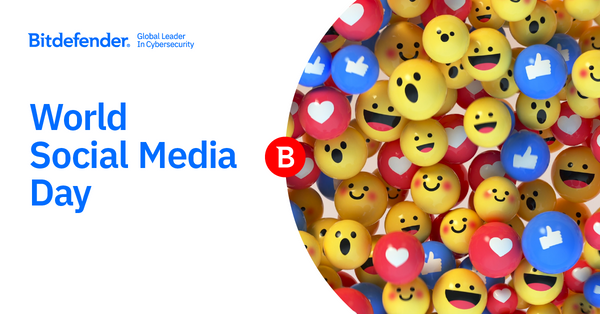Celebrate Social Media Day with Enhanced Cybersecurity Practices

Hello there fellow netizens and social media aficionados!
It’s the time of the year again when the global community gathers to celebrate Social Media Day.
From the highs and lows to the downright viral and nasty posts, Social media has revolutionized the way people connect, interact, and do business. However, with great connectivity and social media presence comes an even greater responsibility for every one of us to safeguard our online identity and privacy.
And believe us, we’re right to emphasize this! Social media has forever changed how we live our personal and professional lives, but it’s also created a set of unique security risks that can impact us in all the other aspects of life as well.
Your digital presence on social media and associated risks
A strong digital presence is highly sought after in today’s connected world, as it enhances our careers, networking opportunities, visibility, and relationships. However, it’s a double-edged sword that makes us targets for scammers, identity thieves, bullies, and other digital miscreants.
Here’s a cyberthreat crash course for social media
1. Malware. Cybercriminals use social media platforms to distribute malware. They can target individuals directly through direct messages or use paid advertisements to reach millions to trick them into downloading malicious attachments or accessing fake websites that drop malware, including credential-stealing Trojans, spyware and ransomware onto devices.
Related: AI meets next-gen info stealers in social media malvertising campaigns
2. Phony profiles. Scammers create fake social media profiles to impersonate real individuals, celebrities or retailers to gain trust and extract personal information from unsuspecting users.
3. Catfishing and romance scammers. Fraudsters create fake online identities to lure people into phony relationships and manipulate them into sending money and sharing sensitive information.
Related: How to identify military romance scams. Are you a potential target?
4. Credential Stuffing. Threat actors use automated tools to try and take over social media accounts for financial gain and spread scams. This can be achieved due to poor password practices and records stolen in data breaches.
Related: Stream-Jacking 2.0: Deep fakes power account takeovers on YouTube to maximize crypto-doubling scams
Related: A Deep Dive into Stream-Jacking Attacks on YouTube and Why They're So Popular
5. Cyberbullying and Harassment: Social media platforms are breeding grounds for cyberbullying and harassment that can have serious emotional and psychological effects on victims.
Related: Stop Cyberbullying Day: The Proactive Role of Guardians in Preventing Cyberbullying
Related: Stop Cyberbullying Day: Reacting vs. Responding to Verbal Abuse Online
6. Scareware. Cybercriminals send alarming messages or posts that prompt users to download software to fix a non-existent problem. The software is often malicious and used to hijack the user's system or steal personal information.
7. Data scraping. Social media platforms are a goldmine of personal information for data brokers, marketers and cybercriminals. Cybercrooks and scammers can manually inspect or use automated tools to analyze user profiles, posts and interactions, which allows them to create profiles for potential victims and craft targeted phishing attacks.
8. Social Media Hijacking: Attackers can gain unauthorized access to a user's social media account and post fraudulent messages, send phishing links to the user's contacts, or engage in other malicious activities.
9. Location-Based Threats: Malicious individuals, including stalkers, exploit user behaviors such as sharing real-time location on social media. Knowing your location can help attackers plan physical crimes, such as home invasions, burglaries and other crimes.
Best cybersecurity practices to secure your online accounts and identity and in the social media age
1. Limit Online Exposure: Spending excessive time on social media increases your chances of falling victim to cybercrime and other online threats. Limit your online presence to reduce the risk of harassment, hacking, and other security issues.
2. Stop Oversharing Personal Info. Be cautious about the information you share via social media. Malicious actors can use details like your home address, phone number, and your location to target you.
3. Reduce your digital footprint. Be less visible and more privacy-oriented by sharing less and deleting social media accounts you no longer use.
Pro tip: Stay in control of your social media footprint with our dedicated identity protection service that allows you to easily manage personal data, assess data exposure and privacy risks, and even find old social media accounts you might have forgotten about. With Bitdefender Digital Identity Protection can also stay on top of data breaches 24/7, easily manage your privacy and ad settings on all major social platforms and sniff out social media impersonators who can ruin your reputation.
4. Use Strong Passwords and 2FA. All your online accounts should be secured with robust and unique passwords and enable two-factor authentication for added security against potential hijacking attempts.
5. Review Privacy Settings: Review and adjust your settings regularly to ensure your information is protected and visible only to trusted contacts.
6. Beware of Scams and Phishing: Always scrutinize unsolicited messages and links. Cybercriminals often use social media to launch phishing attacks aimed at stealing your personal and financial information
Pro tip: Use Bitdefender security solutions with scam-busting features such as Scam Alert to block fraudulent attacks coming your way.
Pair a security solution with your dedicated scam-fighting detection tool, Scamio, for peace of mind and a much-needed layer of security.
Scamio helps you identify and avoid potential scams. When unsure about link or a proposal you receive on social media platforms you can check it with Scamio on WhatsApp, Facebook Messenger, or a web browser for free! Copy/paste a text or link, describe the situation, and upload the image or the QR code you want to verify. Scamio will analyze the data and tell you if anyone is trying to scam you.
You can also help your social media friends stay safe by sharing Scamio with them in France, Germany, Spain, Italy, Romania, Australia and the UK.
7. Practice Good Netiquette. Strive to keep a positive digital footprint, and avoid sharing fake news, making mean comments, or tagging others in embarrassing posts. Your online behavior reflects your real-life persona and can impact your personal and professional life.
tags
Author
Alina is a history buff passionate about cybersecurity and anything sci-fi, advocating Bitdefender technologies and solutions. She spends most of her time between her two feline friends and traveling.
View all postsRight now Top posts
Fake Download of Mission: Impossible – The Final Reckoning Movie Deploys Lumma Stealer
May 23, 2025
Scammers Sell Access to Steam Accounts with All the Latest Games – It's a Trap!
May 16, 2025
How to Protect Your WhatsApp from Hackers and Scammers – 8 Key Settings and Best Practices
April 03, 2025
FOLLOW US ON SOCIAL MEDIA
You might also like
Bookmarks







